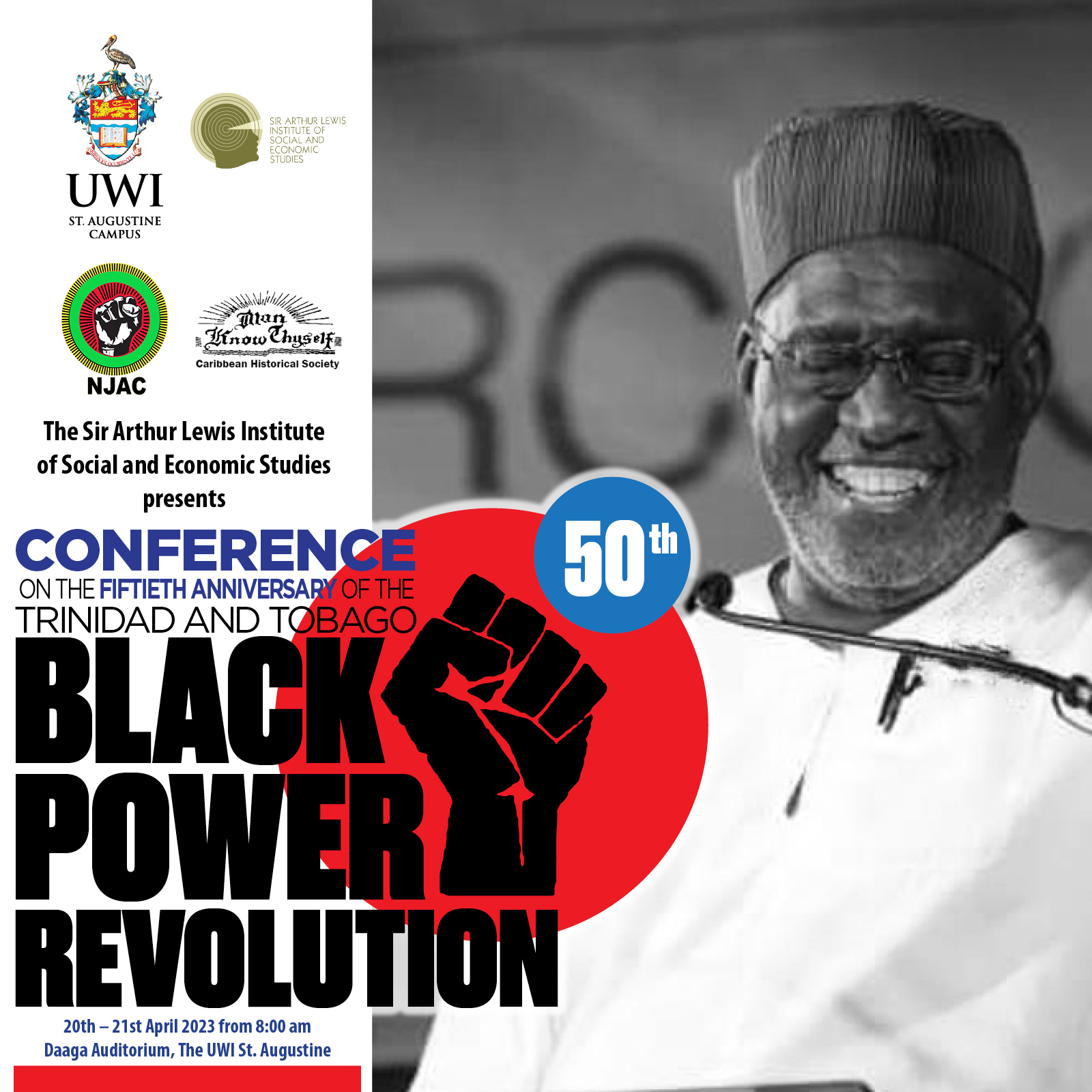Event
Conference on the Fiftieth Anniversary of the Black Power Revolution
Event Date(s): 20/04/2023 - 21/04/2023
Location: Daaga Auditorium
The Sir Arthur Lewis Institute of Social and Economic Studies (SALISES) in collaboration with The National Joint Action Committee (NJAC), will be hosting a two-day conference to commemorate the fiftieth anniversary of the “Trinidad & Tobago Black Power Revolution of 1970.” The conference seeks to highlight the most transformative period in Trinidad & Tobago’s history. Within a mere fifty-five days, under the leadership of Makandal Daaga (formerly Geddes Granger), NJAC’s programme of mass demonstrations, public meetings, widespread publication and diverse literature, stirred a “New Consciousness” which swept the Caribbean. The fusion of this “New Consciousness” with NJAC’s defining principle of people’s participation birthed the reality that “The Revolution was the people, and the People was the Revolution”.
On April 21st 1970, the first National State of Emergency was declared by the Government of Trinidad and Tobago. The majority of NJAC’s leadership were rounded up and thrown into prison as political detainees. However, this oppressive act of the Government only served to embolden the spirit of the leaders and the people in their struggle to bring about fundamental changes, which led to major achievements in various sectors of the society. Some of these changes and achievements include:
- Influencing the creation of the 1971 “Wooding Constitution Reform Commission”, leading to T&T’s Republican Constitution in 1976;
-A greater spirit of National Unity: (a) The principle of ‘Unite the Nation’ was portrayed on March 12th, 1970, when 40,000 persons answered the call for African/Indian unity in the “March to Caroni” (b) A 56% reduction in crime in 1970 by re-defining the nation as a “family with the guiding principle, ‘Be a Brother, Be a Sister’.”;
-The Economy: (a) Growth of state involvement in the T&T economy after 1970, from eight enterprises to sixty-seven, which opened managerial positions to Africans and Indians locally. (b) Launch of our first national bank, the National Commercial Bank (now First Citizens) on 23rd March 1970. (c) Localisation of all foreign banks and insurance companies in 1970. (d) Establishment of the National Insurance Board (NIB) in 1971;
-Entrepreneurship: (a) Rise of the “People’s Sector” with a major increase of Indian and African owned businesses b) The naming of 1970 “Small Business Year”, 1971 “Co-operatives Year”, 1972 “Credit Unions Year”. c) A 1,000% expansion of the capital base of credit unions in the decade of the 1970s;
-Equality and Justice: (a) A large reduction in racism (in the banking sector, hotels and Tobago’s beaches to name a few). (b) elevation of nationals in the Church hierarchy, such as Clive Abdulah, the first national and non-white Bishop of the Anglican Church in T&T (Sept 1970). (c) Appointment of Francis Eustace Bernard as the first black Commissioner of Police. (d) T&T is the first non-African nation to give legal status to an African Religion: Orisha Incorporation Act, Egbe Ile Wa (1981).
-Education: Establishment of the Caribbean Examinations Council on 30th April 1972.
From the street corners to business halls, wherever people gathered, messages of the Revolution were expounded and exchanged. Woodford Square was renamed the People’s Parliament, as thousands would gather daily to hear the speeches of Makandal Daaga (formerly Geddes Granger) and other leaders of NJAC, while engaging in lengthy discussion and the passing of resolutions on the issues of the day.
The Caribbean scope of the movement was emphasised by the presence of the Caribbean Liberation Steering Committee (CLSC), which was chaired by Chief Servant Makandal Daaga and comprised of major progressive leaders of the region.
The conference seeks to focus on the most transformative period in Trinidad & Tobago’s history. In any developed society, wherever there is a period in that nation’s history that has made significant impact on the development of that nation, the role of academia has been to give considerable attention to the research, analysis, and interpretation of such events, so as to contribute towards the knowledge-base of that society. Unfortunately, this has not been the case for Black Power Revolution in relation to Trinidad and Tobago.
The main purpose of this conference is to inform and enlighten the population, in particular, the youth, on the significance of the events that occurred during that period as well as to marry the research and analysis of the academics with the experience, knowledge and wisdom of some of the activists who were involved at the time. A main aim of the conference is to demystify the Revolution and clarify a lot of distortions and misinformation that have existed in the public domain over the years.
Date: 20th -21stApril 2023 | Time: 9 a.m. - 5 p.m. Daily
Venue: Daaga Auditorium, The UWI St. Augustine
Interested persons can register using the following link https://bit.ly/blackpowerrevconference
For more information, email Francine.Alleyne@sta.uwi.edu or visit https://sta.uwi.edu/salises/

Open to: | General Public |
CONTACT
Marketing and Communications Department
- Tel.: (868)-662-2002 ext.2013/2014
- Email: marketing.communications@sta.uwi.edu

